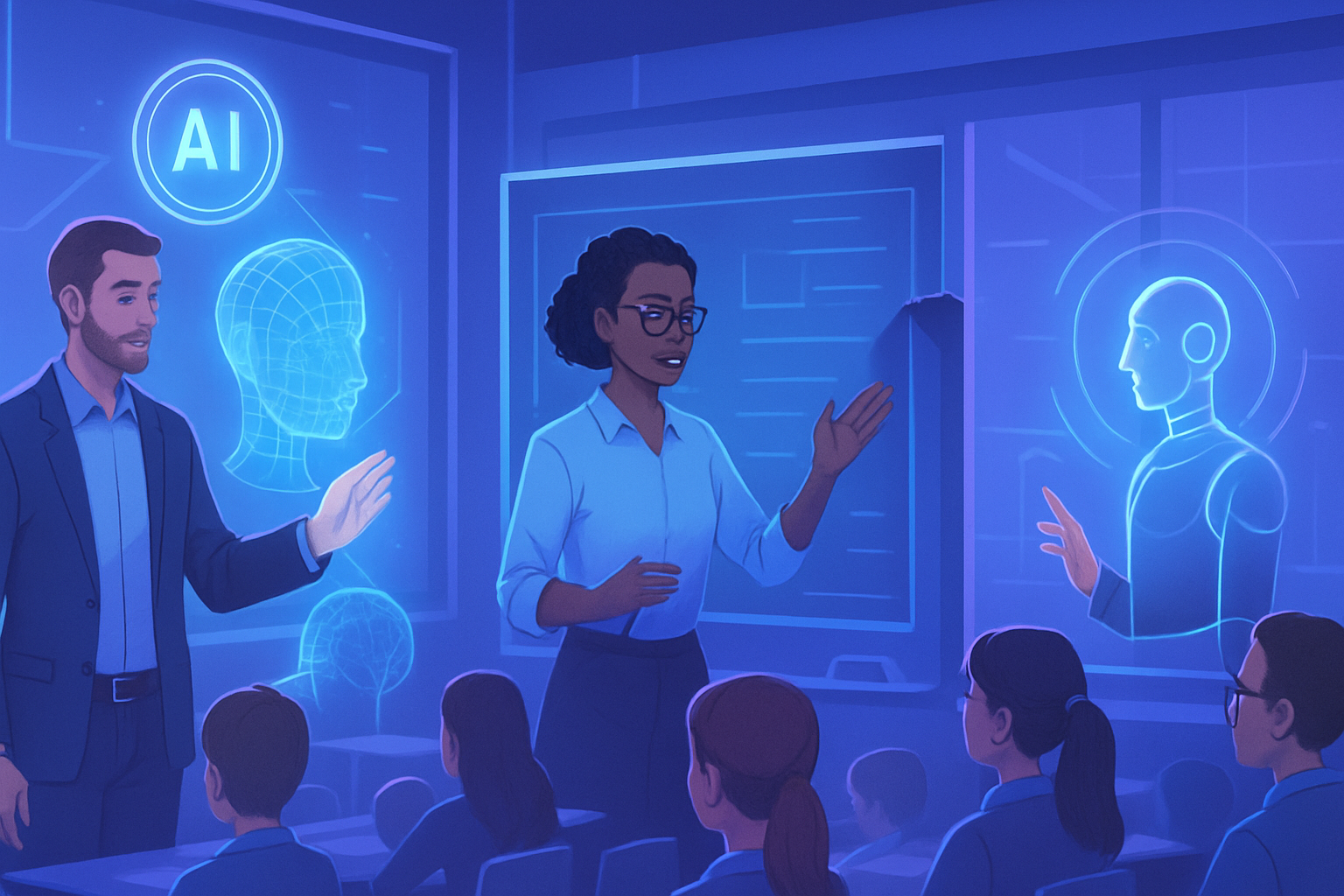The integration of artificial intelligence in education challenges traditional teaching methods. Teachers in England, now allowed to use this technology, envision a new educational era. _AI promises to alleviate administrative tasks_ and promote a balance between professional and personal life. _However, the increased dependence on technology raises ethical and practical questions_. This change, while exciting, occurs within the context of chronic underfunding of the British educational system.
Use of Artificial Intelligence by Teachers
Teachers in England can now integrate artificial intelligence (AI) into certain tasks of their professional daily routine, as reported by the BBC. This initiative comes from the Department for Education (DfE), which clarified that AI can be employed for tasks considered low-risk. Thus, writing letters to parents and grading assignments become areas where AI can relieve teachers.
Results of the AI Survey
A survey conducted in 2023 revealed that many teachers are quite optimistic about the use of AI in their daily functions. About a majority of the participants expressed a positive feeling about integrating this technology in the educational environment. The spokesperson for Teacher Tap, the company responsible for the survey, noted that the automation of certain tasks has already become widespread, particularly in mathematics education, due to a chronic shortage of qualified teachers.
Benefits of Artificial Intelligence
Feedback from teachers indicates that AI can be particularly beneficial for finding appropriate teaching materials and drafting reports on students’ performance and behavior. By integrating AI into their practice, teachers can reduce unpaid workload, which could improve their work-life balance.
Impact on Teachers’ Mental Health
According to a study conducted by the charity Education Support, 36% of teachers have already experienced episodes of burnout. By alleviating some of their administrative tasks, AI could help improve teachers’ mental health. The DfE hopes to attract more graduates to the profession in the face of a growing shortage of qualified personnel.
Current Situation of Teacher Shortage
The shortage of qualified teachers in England creates daily stress within the educational system. Although the total number of teachers has increased, the ratio of students to teaching staff is deteriorating. In English public schools, it is common to encounter classes with 33 students or more.
Recruitment Issues
The turnover rate of qualified teachers, estimated at 8.8%, underscores the difficulty of retaining staff in the sector. As a result, vacancies are often filled by substitute teachers, which represents a significant cost for schools. This context highlights the urgency of gradually adopting technological tools such as AI.
Cautions Regarding AI Use
The DfE has established that the use of AI by teachers must be done with caution. Each teacher is responsible for verifying the accuracy and relevance of the information generated by AI. This individual responsibility also applies to schools and colleges.
Approvals and Assessments by AI
Companies responsible for evaluating programs and educational outcomes in British schools can also benefit from government approval to use AI. This support comes despite resistance from teachers’ unions, concerned about the implications of this technology on the quality of education.
Underfunding of the Educational Sector
The structural challenges of the English educational system have persisted for several decades. The National Association of Head Teachers (NAHT) indicates that between 2009 and 2022, schools’ investment budgets decreased by 29% when accounting for inflation. The Institute for Fiscal Studies also highlights a 9% decrease in spending per student.
When the cost of subscriptions to artificial intelligence models is comparable to advantageous monthly fees, the choice to prioritize AI may seem appealing. However, the need for increased investment in education remains essential to ensure quality teaching for future generations.
In light of these issues, initiatives aimed at integrating AI into education address an urgent need without solving the fundamental funding problems of the sector.
Frequently Asked Questions
Can teachers in England use artificial intelligence to grade assignments?
Yes, according to the Department for Education guidelines, artificial intelligence can be used for tasks such as grading assignments, provided it involves low-risk tasks.
What specific tasks can teachers delegate to AI?
Teachers can use AI for tasks such as lesson planning, creating teaching resources, grading work, writing reports to parents, and managing administrative tasks.
What is the impact of using AI on teachers’ workload?
The use of AI can lighten the workload, reduce stress, and improve the work-life balance of teachers, according to the Department for Education.
Are teachers trained in the use of artificial intelligence in their classes?
Training for using AI is not systematically provided, leaving teachers responsible for ensuring the tools they use are appropriate and accurate.
What are the risks associated with using artificial intelligence in education?
Risks include excessive reliance on technology, concerns about the accuracy of information generated by AI, and the necessity for teachers to remain involved in the educational process.
How does the use of AI affect the quality of education?
While AI can help manage certain administrative tasks, its impact on the quality of education largely depends on the engagement of teachers and the resources available within the educational system.
Do teachers’ unions support the use of artificial intelligence?
There are concerns among some unions regarding the use of AI, particularly concerning its acceptance in contexts such as school assessments and rankings.
What is the retention rate of teachers in the British educational system?
The retention rate of qualified teachers in the UK is about 8.8%, indicating ongoing pressure to attract and retain teaching staff.
Are financial resources sufficient to implement AI in schools?
The funding of schools is often criticized for being insufficient, which can limit the ability to invest in AI and other educational technologies appropriately.






